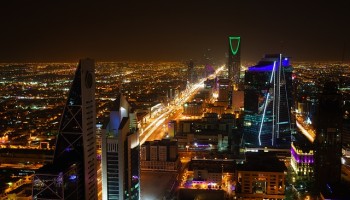Reported by
Migrant workers are dying from electrocution, decapitation and falls from buildings while working in hazardous conditions on construction sites for Saudi Arabia’s ambitious “giga-projects,” including infrastructure for the 2034 FIFA Men’s World Cup. In the absence of effective systems to investigate these deaths, human rights groups warn fatalities could rise into the thousands—and go uncounted.
A new report from Human Rights Watch (HRW) found that many migrant worker deaths are misclassified as natural causes, preventing investigations and denying families compensation. The findings are based on interviews with the families of 31 deceased migrant workers, two social workers in their countries of origin, and three current workers who witnessed the deaths.
In a separate report, human rights group FairSquare cited “numerous structural and systemic problems” in Saudi Arabia’s medico-legal system, including an “almost complete lack of transparency” in the reporting of migrant worker deaths and their causes.
“Saudi Arabia is an exceptionally risky environment for migrant workers,” Nicholas McGeehan, FairSquare’s founding director, said at a press conference Tuesday.
HRW said many of the deaths could have been prevented with proper safety measures and worker protections. Despite this, Saudi authorities have continued to fall short in providing adequate compensation to the victims’ families—compensation that, according to the group, should include mandatory life insurance and survivor benefits.
The number of migrant workers in Saudi Arabia rose 40 percent between 2019 and 2024, reaching 13.2 million, driven by labor demand for mega-infrastructure projects. These include preparations for the 2034 FIFA Men’s World Cup, such as the planned construction of 11 new stadiums, 73 training facilities, as well as new transportation networks and hotels.
As construction ramps up, “the risks of occupational deaths and injuries are further increasing,” HRW warned. FairSquare officials also said Saudi medics rarely, if ever, perform autopsies to determine the precise cause of death when it is not immediately clear.
The human rights watchdogs accused FIFA of failing to uphold its own human rights policies when awarding the tournament to Saudi Arabia without requiring “proper human rights due diligence, guarantees of effective worker protection requirements, including from extreme heat, or ensuring social security to workers, including survivor’s benefits and other compensation, such as mandatory life insurance.”
According to McGeehan, “FIFA’s assessment of the risks [of awarding the World Cup 2034 to Saudi Arabia] was amateurish [and] utterly negligent…despite the obvious risks that [rights groups] have identified.”
He also criticized FIFA President Gianni Infantino’s presence alongside Donald Trump’s delegation in Saudi Arabia this week, calling it a sign of deeper concerns within the organization.
“That speaks to the fact that FIFA has transformed from a merely dysfunctional organization into one that is actually quite sinister, increasingly dangerous, and plays a remarkably unhelpful role in geopolitical affairs today,” McGeehan said.
Michael Page, deputy Middle East director at HRW, stressed that “the gruesome workplace accidents killing migrant workers in Saudi Arabia should be a huge red flag for businesses, football fans, and sports associations seeking to partner with FIFA on the 2034 Men’s World Cup and other Saudi ‘giga-projects.’”
In March, Muhammad Arshad, a Pakistani migrant worker, fell to his death from an upper level of Aramco Stadium. His death was the first officially reported fatality on a World Cup construction site, occurring just three months after Saudi Arabia was named the 2034 host.
The impact of these deaths often extends beyond individual tragedy, creating long-term hardship for families. Many lose their sole breadwinner, forcing children into the workforce.
“To make ends meet, I have put my 14-year-old son to work, and the little money he earns is used for our daily expenses,” said the widow of a Bangladeshi worker.
HRW also documented the emotional and financial toll of burial and repatriation. According to Page, several families said they were offered “financial incentives” to agree to burials in Saudi Arabia—offers that, if refused, were sometimes followed by the withdrawal of compensation and demands that the family pay for repatriation themselves.
In response to HRW’s findings, FIFA said it plans to establish a worker welfare system in Saudi Arabia with mandatory standards and enforcement mechanisms for World Cup-related construction and services. However, the organization did not outline any specific steps to prevent, investigate or compensate for migrant worker deaths.






